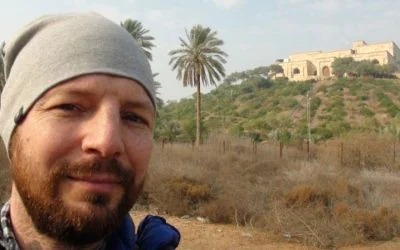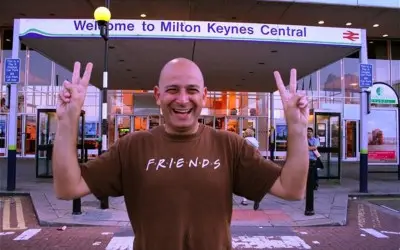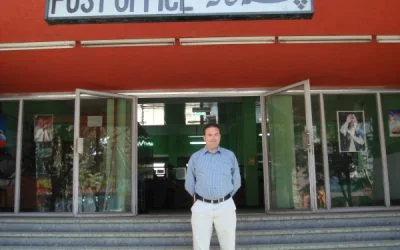Per is a likeable, gregarious traveller from the United States who has almost completed the UN Countries. We have decided not to edit his considerable responses, which make this interview the longest we have published. But stay to read this, and you will feel you have really met a true traveller!

Mazar-i-Sharif, Afghanistan
Per, tell us something about your early years and how your love for travel developed.
Many travelers like to believe in the power of free agency and their own pro-active, dynamic nature having driven their own explorations. However much our life’s direction is influenced simply by the “accident” of our birth, circumstances we are born into, the people and ideas we are exposed to in our tender formative years. If I had been born in some poor mountain village in China, the chances of me even leaving my village, my province, much less crossing an international border could be quite small… So I am quite grateful for the good fortune of becoming a traveler.
I was born in the US Army’s 97th General Hospital in Frankfurt, Germany, son of an American father and a Danish mother back in July of 1969, a week or two before man’s travels horizons had further expanded with the first moon landing. My father was a US naval officer who had retired and moved to Frankfurt, enrolling in a master’s program in economics course at the local university. At this time he made good use of the extensive US military base facilities, including the U.S. Army Dental Clinic where he recruited my mother, a Danish dental assistant half his age, to marry him. When I was four we moved to suburban Portland, Oregon area where my father was born way way back in 1912 and where I was fortunate to meet my grandparents during their last years. Danish had been been my first language but I then made transition to English. Growing up in a very homogenous suburban USA my playmates would give me funny looks hearing my mother speak to me in Danish so I tried to convince my mother not to speak that “weird” sounding language to me in public. From that inauspiciously humble, conformist start later on in life I would later have little shame at all in speaking foreign languages. However growing up with a Scandinavian name like “Per”, pronounced “pear” I had some explaining to do as well as having to putting up with the occasional fruit-focused jokes.
I grew up the pretty normal all-American kid in the American suburbs although my mother every couple of years would take my older brother or myself on a summer trip to Europe to visit family in Denmark as well trips down to Germany, Spain and some occasional new country or two thrown in. I gradually fell in love with travel, especially by train whether it be seeing the landscapes and cityscapes rush by during the day or being lulled asleep at night by the clicketyclack sound and gentle, comforting sway of the trains passing over the rails. The feeling of being in motion. The excitement of finally arriving in new destinations.
My parents both spoke a few languages and it seemed pretty natural for me to do the same. By college I had taken six years of Spanish and a couple of years of German. My second year of college I opted to go on an exchange program in Germany as part of my major of International Relations with concentration on Soviet Union & Eastern Europe. This was 1988-1989, the Cold War still very cold and Berlin Wall and Iron Curtain still divisions, separating ideologies and people. In November 1988, I went with a group of 40 foreign students from the University of Freiburg on a weeklong heavily subsidized junket to West Berlin with presentations on German history and prospects of Reunification of Germany. A reunification that at the time was just a far off idealistic possibility. I made the trip over to East Berlin with a few friends, the East German border guards serious and unsmiling, checking our ears to see if they matched that of our passport. I had an extra point of concern, sweating, my heart racing, East Germany currency, that I had changed at seven times the official rate was concealed in my underwear. Luckily no searches of such an intimate variety. Later on in that year I found myself a brighteyed and curious… and a doubtless very naive, nineteen year old exploring more of Iron Curtained Eastern Europe; Poland, Czechslovakia, Hungary, Bulgaria, Romania and Yugoslavia. A tantalizing taste of comparing book learning, headlines and TV news images with what I could see with my own eyes.
That year in Europe was a pivotal year in my travel journey. Such a hunger to travel with new territories to explore in all directions. During vacation periods I would buy month long train passes where I would save money on hotels by spending many night on the train, oftentimes waking up in the morning a bit bleary eyed but looking forward to the day’s new exploration. Sometimes as many as four nights in a row on a train, sleeping at night, exploring cities during the day as I did traveling from Yugoslavia to southern Spain arriving in serious need of a shower. On weekends during the school year I would be hitchhiking to places mostly in the region with plenty of opportunities to practice my German with my “chauffeur”. Free German language training practice and cultural interchange + free transportation, all in one.
One year in Europe and I realized I had only scratched the surface. Eventually after finishing up college in the US I was lucky to be involved with the fantastic student organization AIESEC that enabled me to return to Germany to work. And then eventually I moved on to work in Portugal, Italy and France picking up new jobs and languages along the way.
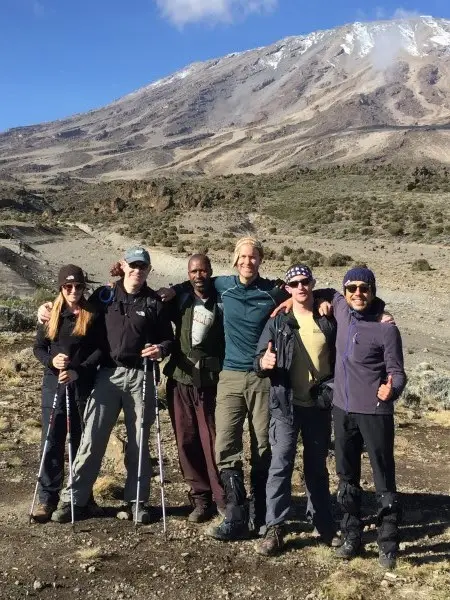
Tanzania, Kilimanjaro
You are an American who has lived in many different places. Tell us a little about each of these, how the places were different and how you find these places make you different?
As an American (or other native English speaker) we are born with a huge blessing. The ability to speak the language of global communication. It makes it easy for us to travel and oftentimes in international groups it is our fluency in English, not our intelligence or the strength of our ideas, that let us dominate conversation.
This blessing can also be a curse as we easily get used to play on our own “linguistic home turf”. It is the other who adapts to us, learns our language and in so doing learns more easily how we think, rather than vice versa. When we however live in other people’s countries, learn other people’s languages and cultural values embedded within, we more likely deeply transformed by the experience. And we become different people… and perhaps run risk of multiple personality disorder!!
In my case living and traveling abroad has been a gradual expansion of my cultural comfort zone. After being raised by a Danish mother and having studied in Germany I was at ease with Northern Europe’s comfortably predictable and occasional confining structure and rules. Later moving to live in more laissez faire Southern Europe (Lisbon, Milano & Paris) I found myself more comfortable with the relative fluidity and ambiguity of situations where personal relationships trump more abstract, explicit rules.
At that time I was quite Eurocentric because that was all I knew. And after 3 1/2 years in Europe I had planned to go back to US only to then return to Europe after my MBA. My plans took a bit of a detour in 1995, right before my MBA, as I took 20,000 km bus trip around South America, largely in Brazil. I was transformed. Brazil spoke to me. The warmth and spontaneity of the people unlocked new parts to my being. I felt like a more human human. I eventually ended up six months in Buenos Aires and later six years in Sao Paulo. As much as I loved living in Sao Paulo I started feeling a long distance from the world. Sao Paulo is multi-ethnic due to earlier immigration but not so multi-cultural. The Italian-Brazilians, Japanese-Brazilians, Lebanese-Brazilians, Afro-Brazlians etc., over generations, all very well adapted to this warm and inviting Brazilian culture and all simply become Brazilian. I was missing the rest of the world.
So in 2003 I moved back to Milano, with its combination of the “dolce vita” of Italians and a certain seriousness, structure and work ethic more akin to its Northern Europeans cousins. What a pleasure to move back in a continent densely packed with such a breadth and depth of languages, culture, history etc. At this time Libya was opening up to American tourism for first in almost 20 years and I traveled down by train to Sicily, boat to Tunis where I took a left across Libya to the Middle East and back through Turkey and the Balkans to return to Milano. Visit to Libya turned out to be not just any visit as it served as the springboard to start working in Libyan tourism. I then worked for a couple of years as an intermediary between a Libyan tour operator and the foreign markets, flying to Tripoli from time to time when we had some special high value groups e.g. Stanford Alumni Association, 250 Aussie/Kiwi person high end chartered Qantas jumbo jet visit, luxury cruise line landings etc. A golden time for tourism to Libya and golden opportunity for me to dip my toes into Arab culture. And just as quickly as doors can open they can also close. Once again no more visas for Americans which ended my work in Libyan tourism. I then shifted my attention to Asia embarking on a trip from Bali to Tokyo via SE Asia and China, traveling by land with occasional short hops by sea.
Passing through China on that trip I felt this electric energy that then inspired me to move to Beijing, study Chinese and then look for a job. I imagined that with my language learning experience I could also learn Chinese fairly quickly. Wrong. Humbling and wrong. It was a much higher mountain to climb than I had imagined but then I found China and learning Chinese quite addictive. For a period of four years I only went to one new country, using all my travel time to dig deep into China, eventually traveling to all the 30+ province and, administrative regions. Eventually seven years in Beijing’s smog and I was ready for a breath of fresh, clean air, moving back to the West, choosing London for its amazing multi-cultural diversity. Coming from the more individualistic, ego-driven West where the individual is valued over the collective, my time in China was a good exercise in developing an appreciation for the more Confucian values of how the family, the team, and even the nation can trump the value of the individual. Some could say that it can be a type of Stockholm Syndrome or maybe simply a developed form of empathy but the longer one stays in a place with a very different values like China one has two options. One can suffer and reject these differences like the “bitter expat” who is always complaining, or become less judgemental, adapt and appreciate things in the context of China’s unique history and culture. And thus even become a bit Chinese….
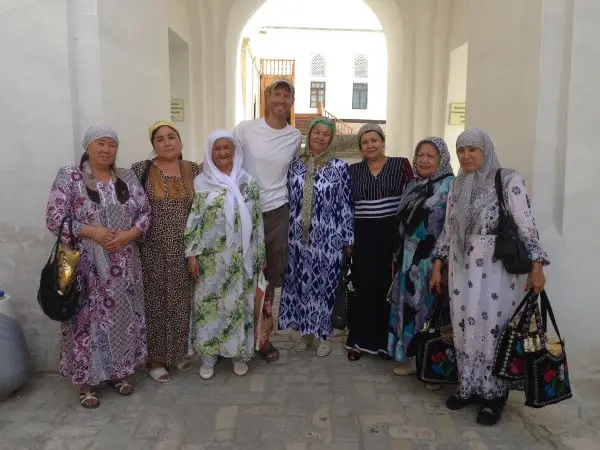
Bukhara encounter with Uzbek tourists
What kind of traveller are you?
I’ve always been enchanted by the idea of the journey, the old style of the travelers of the past traveling way way over the horizon, from point A to some far off point B, by local transportation and without ever visiting airports. By land and by sea passing intimately over the face of the earth. Slow and low. Trips like this that I have made have included Hong Kong-Lisbon (via the Transiberian), Bali-Tokyo, Beijing-Bangalore (over Pakistan). In the early years I was the classic budget backpacker type carrying the big backpack, sleeping on night trains and buses, staying in youth hostels and cheap guest houses, picnicking on park benches watching the world go by. Classic budget strategies for the phase in life when there is more time and energy than money.
As I I have gotten older and have had less time and more money I have noticed a higher “pain threshold” keeping me more off 20 hour cramped bus trips, and more on flights to save time, sleep and backache. These days I normally stay in hotels but occasionally relapse to my youth hostel ways when traveling through places where it is great way to meet fellow travelers e.g. Central Asia. I admit to a bit of an internet addiction so I usually prefer to at least stay in a place that has Wifi. With the wisdom/experience/laziness of passing years I have become a more efficient packer, ditching the big backpack, and instead even on trips of a month or more carrying about 8-9 kilos in a compact backpack. That trusty backpack never gets checked in at airports and can be discretely carried around all day without being pegged as a tourist just fresh off the boat. Since as of late most travel in warm climates I have have been traveling just with limited selection of easy to wash quick-dry sporty clothing. My friends occasionally make fun me because as of late almost all of my travel photos are of me in some type of some variation of a synthetic blue sports t-shirt. Not very imaginative but certainly makes ones morning fashion choices a bit easier.
Most people would rather stay at home than travel alone. I on the other hand would much rather travel alone than stay at home. However for me traveling with the right people, naturally quite a subjective choice, is the best of all options. As of late I’ve run into some more “extreme travelers” and have kept in touch with them even arranging to travel together to some unusual destinations. This has been a very nice change of pace. Traveling with the right person(s) oftentimes doubles the pleasure and halves any pain and discomfort. Any hassles, dangers or crises become some of the best travel stories…. And for the rest of ones life one shares a special bond of the shared memory, each guardian of a different version. And when one meets one may reminiscence aloud “Remember that time in Timbuktu when….?”
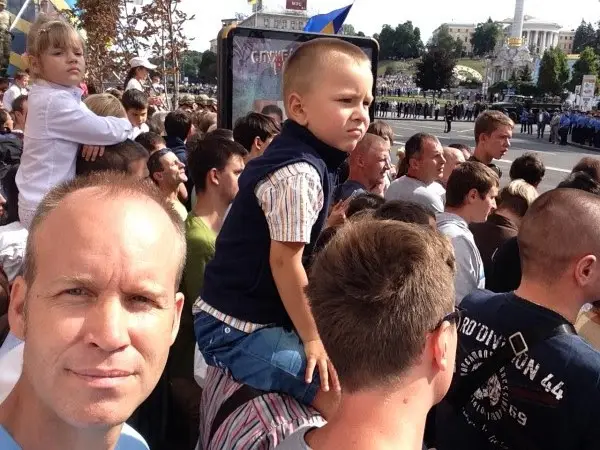
Kyiv – Ukraine Independence Day Celebration
What has motivated you to want to explore every country of the world? Tell us some of the highs and lows of your quest.
Given that I grew up in a fairly international family I early on took baby steps in the travel world, and as grew up my curiosity drove me to dream of traveling even more. When I was fifteen my family members made lists of countries we each had been to. My father had been to what was for me a mind boggling 75 countries. If you had asked me then and there how many countries I would reach in my life I probably would have answered “50 or 60 countries”, never I imagining ever getting to as many as my father. As time went by and I lived in and explored Europe, South America and Asia the numbers of countries visited started to accumulate to the point where one day I actually counted them and I had found that I had visited over 90 countries. The 100 country mark then was not far away. Not too much later I had good fortune to meet people even more well traveled then myself. So inspiring to hear their travel stories and it was then I imagined that is was possible to one day travel to all 193 UN countries.
I’m humbled and grateful to think I have now been to 180+ countries, one country and many stories at a time. My father finally passed away in 2011 at age 99 finally finishing up with perhaps 90 countries and taking trips abroad with my mother, or even solo as late as age 91. I think he would have be quite tickled to know that I continue to follow his traveling footsteps…
There have been so many high points on this journey. For me sometimes they are at the moments when I arrive at some place that I have often heard about, dreamed about since I was a child. Feeling present and absorbed in the moment and realize how exceptionally lucky I am. Feeling so lucky that my eyes tear up at the sight I behold; the majesty of Mt. Everest as I flew past it on way from Nepal to Bhutan, the weighty presence of the Kremlin on Red Square in Moscow, the sublime colors of the dunes at sunrise in the Libyan Sahara and so many others. There are also those countless pleasant surprises off the beaten track in places I had never heard weeks, days or even hours before.
And then there are the thousand acts of kindness, large and small, one receives from locals and fellow travelers, the moments of shared humanity with people of different culture and language, sometimes being able to communicate through gestures and smile.
Where there are high points there must be low points to appreciate the high points even more. However for the privileged class of people like ourselves who find ourself with luxury of leisure traveling I find myself relativizing a bit my “lows” knowing that this “manufactured challenge” is often nothing compared to everyday challenges for people on the ground just trying to get by. Where perhaps their only trip ever is from the village to travel to local market town. Who am I to complain?
I’ve been lucky to never to suffer any real setback traveling, no injury or life-threatening illness, no crime that radically changed my trip or caused huge inconvenience. Biggest loss I’ve had is to recently lose a passport with 101 out of its 102 pages (as an American I was able to add two additional sets of 26 pages each to the original 50 or so pages) absolutely full with stamps and visas, vivid memories on every page. I had preserved one page free and clear of stamps with a penciled in writing “this page only for visas” so that no country’s customs agent would give me hassle for having a “full passport”. I was lucky to usually to get friendly cooperation to squeeze in the passport stamps where there was at least a tiny bit of extra space. I’m not much of a collector of souvenirs but passports have a special sentimental value especially when many of the visas had special backstories of frustration, relief, triumph and even comedy… In this sad moment of sentimentality of my passport loss I was lucky that I had a backup US passport that allowed me to continue my trip. Passport perhaps lost and gone forever but memories and lessons from the road nobody can ever take away…
For the traveler who is finishing up the 193 UN countries there is often a low level underlying anxiety that one simply won’t have a visa granted to a certain country. As an American this is less of a problem than for certain other nationalities, but even I have faced the thought of “what if I get turned down for a visa?”, “what if I am put on some type of black list at embassy?”, “what if I piss off the embassy folks so badly that they somehow turn down my visa out of spite?!!”. Luckily so far so good for me. I had some inexplicable challenges getting the Eritrea visa but then finally my good luck came through, the Eritrean visa all the more precious to me when I finally saw it lying there new and shiny in my passport.
One definite low point of solo travel can be loneliness. While all around one sees people together leading their lives; the groups of friends, the families, the couples sharing the warm emotions of togetherness, one can often feel like an outsider, a person looking through the glass at fish in the aquarium. These moments of loneliness can however serve as a positive impetus to become more interactive and connect with those around. In my younger years I was more on the shy, introverted bookwormish side but travel has made me more extroverted, willing and able to talk to and value the interaction with people of all ages and walks of life. Learning to truly connect to the people around us is the best antidote to loneliness.
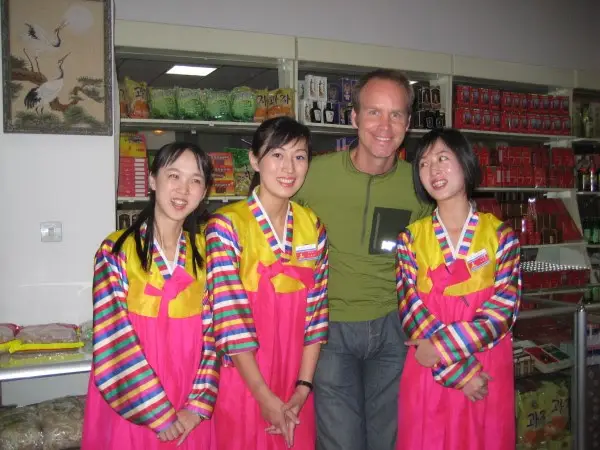
Pyongyang – North Korean women in local dress
What have you had to sacrifice, is anything to be a big traveller?
For many years my priority has been moving to new countries, making fresh starts, learning new languages and finding new job opportunties; While many of my old friends have settled down comfortably with the stability of a family life, the car, paid off mortgage and gone deeper in their career, I have found myself jumping around, exploring wider than deeper. Some of my friends are a bit jealous of my life but I can’t say that I am totally unjealous of theirs. The grass is often greener on the other side of the fence I suppose. Although my father did quite well for himself meeting my mother and marrying at settling down at age 54 so there may be hope for me as well…
With the desire to constantly explore new countries there one is also the sacrifice of not going back to old favorite places and neglecting to nurture relationships with old friends and families as much as one would like. Often when I do go back I find it quite a revelation. Besides often being bathed in a warm sentimentality old memories being coaxed out of their hiding places, we can be reminded how we used to think about that place specifically and how we viewed the world in general. And then comparing it with our present impression we realize how much we have evolved, usually for the better. So once I finish the 193 countries I will definitely be traveling back more often to familiar territory, and seeing more of old friends and loved ones. If any of you are reading this you are hereby advised!
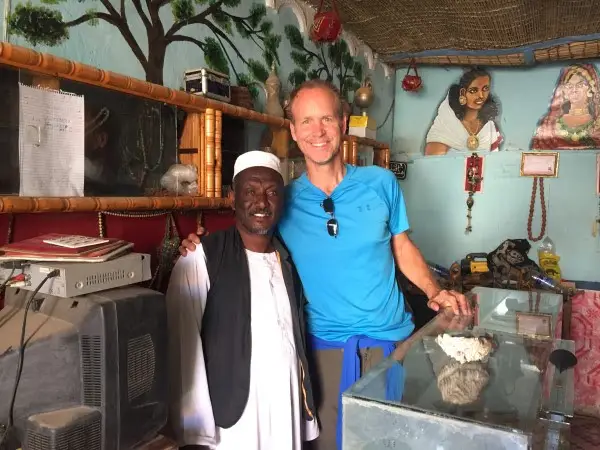
Keren, Eritrea
You are now based in London. What, if anything, has surprised you about London and the UK? Has the place been as you expected or not, and why?
After seven years in the relative monoculture of China, moving to London has been a feeling of being connected to the world without even needing to travel more than a few Tube stops. For many years I had never considered even living in the UK, preferring to live in non-English speaking countries where I had the feeling of constantly being challenged and stimulated speaking different languages. Of course there was also the UK’s the reputation for bad weather and even worse food. While it is true that here an umbrella is more important than sun creme, the diversity of tasty ethnic food is as rich and abundant food as is the diversity of culture and language. And every day in London I speak multiple languages and interact with people from countries far and near, all places that have touched me in different ways. In speaking to people from the world’s four corners I continue a relationship; connection and learning about their country. Actually physically visiting that country is only part of that relationship. The learning is lifelong.
In years past I have heard debates of the well-traveled set regarding what city is the the most international, the most cosmopolitan, most global of world cities. And usually the debate would come down to New York and London, a tale of two global cities. Admittedly I am no expert on New York, but my belief now is that that the multi-cultural bubble that is London in a more homogeneous Britain, even in a post-Brexit world, is the world’s most global city. As multi-cultural as New York is within a 3-4 flight radius one could travel to perhaps a couple of countries; Canada and the Bahamas. Whereas from London that would mean one could travel to perhaps fifty countries or so. People move to New York more often living the immigrant story, becoming New Yorkers and then Americans whereas there are many that move from abroad to London become Londoners, but never British. And retain their culture, never cutting the umbilical cord to their mother countries, easily traveling back for important holidays, marriages, or the random long weekend, thanks in large part to democratization of travel through the world of low cost airlines.
Recount a couple of travel vignettes which have had a lasting impact on you.
Travel has a lasting impact on people usually not at the moment when we are simply checking off the places that we had planned to see, but rather the transformative power of travel lies in the surprise realizations that one has on the road. Those “aha” moments of understanding where are paradigms are set upside down, stereotypes are shattered, and we realize that god forbid we are actually wrong about something. Imagine that!!! It is then that the external stimulation of the journey provokes the journey inside.
Back in 2002 I was making my first trip through sub-saharan Africa, recently crossing from Namibia into the South Africa to the town of Upington and then got into a mini-van to Kimberley. Classic African mini-van trip with its seating practice of “always room for one more”. Five people sitting in each row, not always space for both buttcheeks to make contact with seat, local music blaring from crackly speakers. I stick out for being the only white and at 6’4″ (1.95m) the biggest guy to squeeze into the mini-van. In the row behind me a curious fellow passenger would half-yell questions in my ear. Standard questions that all travelers get and we patiently answer without giving too much thought. Finally a question that I hadn’t heard from before and I wasn’t sure how to respond. “How long did you plan to come to Africa?” Hmmm…. I wasn’t really sure what he meant. Did he mean “How long ago had I bought my flight ticket?” or maybe “How long had i been planning my travel itinerary?” or maybe “How long did it take me to pack?”. All of sudden I had an answer for him. Not sure if it was really answering the question that he had in mind, but my answer was certainly pleasing to him.
In answering his question I actually ended up answering my own question of why I travel in general. I told him “I have been waiting my whole life to come to Africa”. At that moment I realized that my whole life of hearing stories, reading books, watching TV and movies that depicted Africa was all preparing me for this moment of coming to Africa and seeing with my own eyes. The curiosity to compare the Africa of my imagination with the Africa that I would see for myself was the reason I was traveling to Africa specifically. Or actually anywhere for that matter. And it is the difference between what I imagine in my mind and what I see with my own eyes that is for me the real learning and magic of travel.
Growing up in the US during the Cold War the Russian Bear was the Enemy #1. Portrayed in our Hollywood films as cold, unsmiling and ruthless, the Russians were an easy target for demonization. It wasn’t until 2001 that I could see for myself how Russians really were. Traveling up from Hong Kong through China and Mongolia, I visited Lake Baikal still frozen in early May and hopped on the 77 hour train trip to Moscow. The female uniformed train attendant “provodnitsa” responsible for my wagon showed me to my cabin and I found myself alone with the cabin’s only other occupant. Captain Sergei of the Russian army. I spoke almost no Russian and Sergei spoke almost no English + a few words less of German. And somehow that was enough to “make conversation” over the next three days. Three days of sharing food (and drink), making explanatory diagrams, stick figures and maps, occasionally pantomiming stories for dramatic effect. And sometimes… or actually most times we would run out of words and we would simply smile. And laugh at our absurd situation. A funny sense of camaraderie, fraternity and goodwill even though we could scarcely communicate in words.
Five time zones later we arrived in Moscow. All those hours on the train had given us “train legs” and we stepped out on firm ground in Moscow but the body felt like it was still moving. The train platform was of course stable and fixed but it felt like it was swaying, or I was a bit drunk. After a bit of introduction to Russian vodka and beer over the last few days that was probably partially true. But stranger still was the feeling of saying goodbye to Sergei. Making friends on the road is usually accompanied by an exchange of contact info, with perhaps a thought of keeping in touch and maybe one day seeing each other. However I didn’t speak Russian, much less able to read Russian. Sergei was similarly challenged with English. So no exchange of contacts. Just one last round of smiles, a warm affectionate Russian bear hug and farewell as he left with the friends who had come to receive him. He left and I felt a bit sad, empty and alone, as if I had lost a close friend. This experience illustrated for me how deep connections can suddenly be created between people when there is simple goodwill and both sides our open to each other. Even between “old enemies” and even with scarcely the need for words.
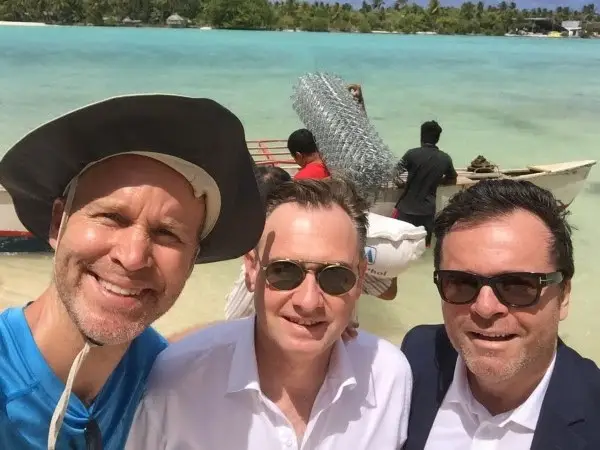
Tarawa, Kiribati, fortuitous encounter with extreme travelers Kolja S. and Harald
You are not very active on social media it appears. Why so? Are you a consumer of many travel publications or blogs or not? Are there any travellers in history you especially admire?
It is only in recent times that I realized the existence of the whole “extreme traveler” community and the social media they produce. For a long time my method to travel was simply buying a Lonely Planet book, paperback and then digital, and use that as the skeleton structure to trip planning. For some fresh travel info on important timely information like visas, safety or perhaps some transport links I would go on to Lonely Planet Thorn Tree discussion boards to scour for useful up-to-date tidbits. Whereas as a boy I could devour picture books of far off lands, far off peoples and far off cultures I have found as of late that I prefer not to see many images of places I see beforehand. I prefer to have the surprise and visual impact of seeing something for the first time. And often the published images one sees are from the most fantastic day, with the most fantastic lighting, perhaps with a magical filter or two thrown in. How can real life compete with that?! No/little expectations leaves little room for disappointment.
I do however like to read books on specific countries or regions as a way of preparation. Travelers accounts are often my favorite. Even though he can be quite crusty, cynical observer I’ve devoured probably six or seven travel books by Paul Theroux. I’ve found his long land journeys across entire continents to be of of huge inspiration. As of late I have been reading a few books on the history of Africa as I have been particularly fascinated by the diversity of Mama Africa and how her countries have followed different paths of development, in the colonial and post-colonial periods. And now that I am prepared to visit the Republic of Congo (DRC), my 54th and last country in Africa I have been lucky to find “Congo: The Epic History of a People” by David van Reybrouck, a fantastic read on this massive, sprawling and troubled country.
At the time of beginning of social media I was living in China where Facebook and other social media were blocked by government and not easy to access. I actually did sign up for Facebook but haven’t really posting anything. For a short while I did post some photos on Chinese social media app Wechat, an app which is somewhat of a cross between WhatsApp and Facebook. At first I enjoyed getting likes, comments etc. but after a while found it a distracting (as well as mildly addictive). Instead of being “present” in the travel moment, I was thinking about what photos to take and how to “produce” the experience for an audience. That being said I am quite grateful for people to post things on social media that provide useful information for others. I believe there is good karma in helping fellow travelers and passing the good energy forward. It is the rare traveler, and perhaps only the uniquely selfish/sociopathic, who having received countless acts of generosity from strangers, does not themselves become a more generous giving soul.
While not active in blogging, social media etc. I have kept a diary/journal every day, whether traveling or not, since January 1st, 1993. A New Year’s Resolution that actually turned out to have some staying power. I do it the old school way, pen on paper and have now filled up 79 books worth. Plenty of material for any possible travel memoir. Now if I could only had neater handwriting I would have a quite a bit easier time deciphering what I wrote…
And what are your travel plans for the rest of the year?
I am up to 182 UN countries so just 11 left to go, the majority are in South Pacific. When I have the chance I like to visit countries in regional groupings, giving a good chance to see how countries are similar, and more interestingly trying to understand how and why there are different from their neighbors. Next longer trip I have planned is to make a trip to Melanesia: Vanuatu, Solomon Islands and Papua New Guinea. This trip will have extra special significance for me as my father spent some time in that region during WWII including in the Solomons where his warship, the USS Pensacola, was torpedoed off the island of Guadalcanal in the ominously named Ironbottom Sound. By a twist of fate a last minute change of assignment kept him out of the engine room where almost all his shipmates lost their lives. In comparison my time spent abroad has been pretty and tame and predictable.
A few difficult countries left to visit i.e. Congo, Yemen and Saudi Arabia and a couple ones that are actually pretty mainstream tourist destinations; Ecuador and Colombia. Some people I have met are a bit baffled that I haven’t been to these countries yet. Certainly not out of any lack of interest but because I think there is too much to see there. I want to enjoy them without rushing too much.
And that common question of which country would be last to visit? Hard to say but I am secretly hoping that it will turn out to be Colombia. Over the years I have been lucky to have some good Colombian friends who have complained that I have never visited their country. And finally I could tell them that my visit to Colombia was “last but certainly not least”. I’ve also heard that the country is so nice that I may not want to ever leave…
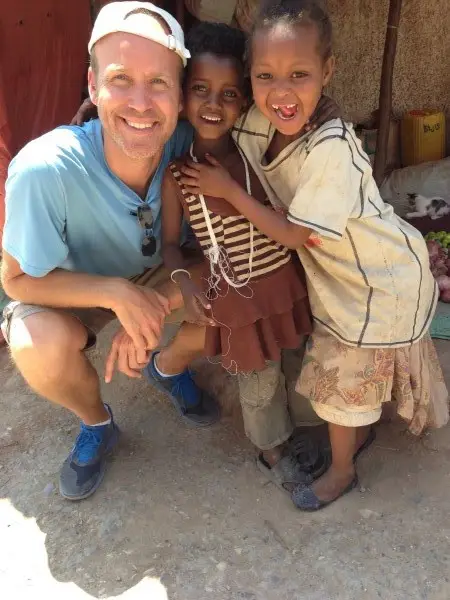
Harar, Ethiopia
Finally, our signature question – if you could invite four people to dinner from any period in history, who would you invite and why?
As a real admirer of explorers who depart across land to discover the unknown I could find no better dinner guest than Marco Polo. Not only do I admire his journey from Italy to China and the innumerable obstacles that he faced along the way but I also respect how he learned languages, adapted to the local culture and could serve as “cultural bridge” between peoples. Unlike certain others I am more of a fan of bridges rather than walls.
Recently I have read a few books by the Polish author, journalist and raconteur Ryszard Kapuscinksi and I have been quite impressed by his storytelling skills, his empathy for the common man, the ability to communicate the texture of time and place and paint pictures with words. There are people who crisscross the world and bore their listeners to tears with their stories, and then there are those who tell how it was to cross a street and we are on the edge of our seats, spellbound and inspired. What a gift it is to learn how to observe the wonders of the world, large and small, and share them with others.
Reading the news of Anthony Bourdain’s recent death I realized I wanted him at this table, not only because he would make sure that we all ate well, and would be coming back for future repeats of these dinners and storytelling sessions. But also because his appreciation for food is just a metaphor for being “present”, being in the moment… nibbling, gnawing, chewing, licking our lips and our fingers as we extract all the flavor and juice life has to offer.. one dish, one bite… one moment at the time. There is something almost spiritual and sacred about sitting down hungry around a small table, beginning the meal with a toast and followed by the brief and spontaneous moment of silence that settles over the table, all lowering their heads digging into those first few life sustaining bites… followed conversation and stories deep into the evening.
Last but not least I would invite my father. He was a lifelong traveler, passionate about history and an avid reader of stories of travel and exploration. He enjoyed telling stories and listening to the stories of others. He would be absolutely enchanted with our illustrious dinner company. And I would also like to hear his stories again, and this time with the maturity of the passing years, I would like to ask more questions. Dig a bit deeper and understand feelings and motivations. See how he saw things, feel how he felt things. And who knows maybe better understanding his motivations I will better understand my own.
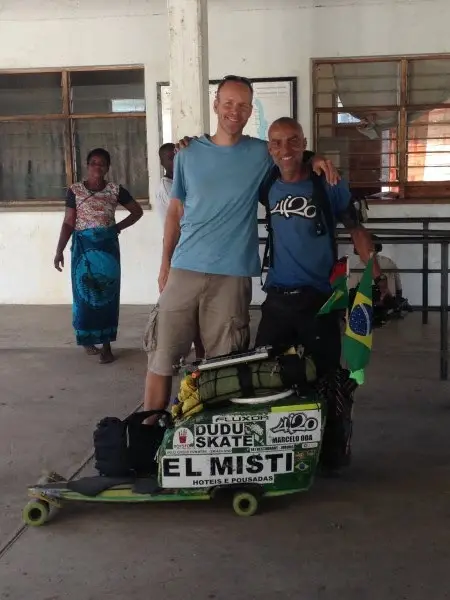
Malawi with Brazilian round-the-world skateboarder Marcelo
The photos in this interview are from Per’s personal collection and we thank him for sharing them with us at NomadMania!
